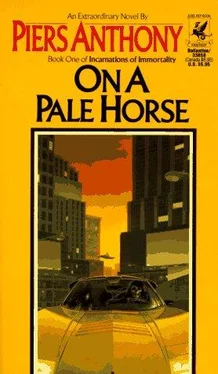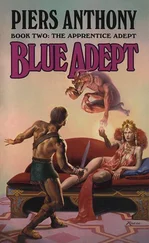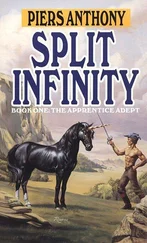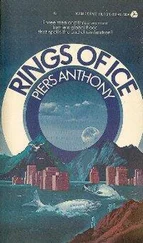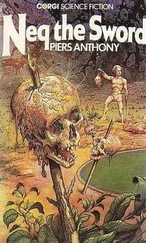Piers Anthony - On a Pale Horse
Здесь есть возможность читать онлайн «Piers Anthony - On a Pale Horse» весь текст электронной книги совершенно бесплатно (целиком полную версию без сокращений). В некоторых случаях можно слушать аудио, скачать через торрент в формате fb2 и присутствует краткое содержание. Год выпуска: 1983, ISBN: 1983, Издательство: Del Rey Books, Жанр: Фэнтези, на английском языке. Описание произведения, (предисловие) а так же отзывы посетителей доступны на портале библиотеки ЛибКат.
- Название:On a Pale Horse
- Автор:
- Издательство:Del Rey Books
- Жанр:
- Год:1983
- ISBN:9780345309242
- Рейтинг книги:5 / 5. Голосов: 1
-
Избранное:Добавить в избранное
- Отзывы:
-
Ваша оценка:
- 100
- 1
- 2
- 3
- 4
- 5
On a Pale Horse: краткое содержание, описание и аннотация
Предлагаем к чтению аннотацию, описание, краткое содержание или предисловие (зависит от того, что написал сам автор книги «On a Pale Horse»). Если вы не нашли необходимую информацию о книге — напишите в комментариях, мы постараемся отыскать её.
The first novel of the INCARNATIONS OF IMMORTALITY series.
On a Pale Horse — читать онлайн бесплатно полную книгу (весь текст) целиком
Ниже представлен текст книги, разбитый по страницам. Система сохранения места последней прочитанной страницы, позволяет с удобством читать онлайн бесплатно книгу «On a Pale Horse», без необходимости каждый раз заново искать на чём Вы остановились. Поставьте закладку, и сможете в любой момент перейти на страницу, на которой закончили чтение.
Интервал:
Закладка:
"I don't know the title or anything. It's just, I guess it's an old whaling song. Maybe I have whaling blood in my veins. It goes — what I can remember — goes like this: …and the whale gave a flunder with its tail, and the boat capsized, and I lost my darling man, and he'll never, never sail again. Great God! And he'll never sail again. It's that 'Great God!' that gets me. I don't give a damn about God, never did, but I feel it, and I don't know why."
Zane suspected the man cared more about God than he thought, but did not make an issue of that. "It's an exclamation," he said, intrigued by the fragment. There was indeed feeling in it, as of a wildly grieving widow crying out in pain.
"It's a protest. Great God! Why did this have to happen? For a sunken ship, or a mine cave-in. Great God!"
"Great God!" the first miner echoed. "But why is a song about whaling bothering me now, when I'm buried in this stinking hole?" the second miner demanded.
"It must have special associations for you," Zane said. "I'm not equipped to interpret — "Clear enough to me," the first miner said. "Drown in the depths of the sea, suffocate in the depths of the earth, and your wife grieves."
"Yeah, maybe she will," the second said, brightening. "But I don't think that's it. It's as if there's a message, if only I could get it." He snapped his fingers as if trying to call the message forth, and the sound echoed in the recesses of the mine. "Look, Death, you want to do something, tell me a story about that song. Anything, just to make it make some sense." This, then, was the client's last request. Both men were gasping now, and time was short.
Zane had to try to honor the man's wish, even if he bungled the attempt. He thought for a moment, then started to talk — and what he said surprised him. "There was a young female whale named Wilda. She roamed the oceans of the world, happy in the company of her kind, and when she came of age she thought she would mate as the other whale cows did and bear a cub and bring it up. But then the hunters came, in their huge boats, and they speared her father and her mother and her bull friend and hauled them out of the water so that nothing was left but their blood and dreadful fragments of their bodies that the sharks congregated to consume. Wilda escaped, for she had learned magic; she changed her form so she resembled a trashfish and swam away. "She grieved, singing her whale song of loss and pain, but she was angry, too, and confused. Why should these little creatures from land, called men, come to slay whales who had never harmed them? It seemed to make no sense. She realized that she had no hope of dealing with the problem when she didn't understand the motive of the enemy. So Wilda changed herself into human form and walked to the fishing village where the whalers lived. "Some human folk laughed at her, for she was naked and innocent of their ways. But a young man named Hank took her into his home, for she was also beautiful. Hank lived with his widowed mother, and the two of them clothed her and taught her the tongue of their kind, and she learned quickly, for she was an intelligent whale and really wanted to know the nature of this strange species. She learned that Hank was a whaler, who went out periodically to hunt whales, for that was how he earned his living. Here on land, food was not free for the taking; people could not simply swim about and open their mouths and catch and swallow succulent squid; and when it grew cold they could not blithely migrate south to warmer waters, for travel was complicated on land. A human person had to work and get gold, and he used this gold to buy all the necessities that life on land required.
"Now Wilda understood. There was no personal animosity here; the men folk had a more pressing lifestyle than the whale folk, which compelled them to acts they might not otherwise have considered, and they did not regard the whale folk as sapient creatures. Perhaps if the men folk were made to understand about the culture and feelings of the whales, things would change and the dreadful killing would stop. She tried to explain to Hank, but he thought she was joking. After all, his father had been killed by the flunder of the tail of a whale, so that his grieving mother had had to bring him up alone. Great God! How could he feel for the whales? He asked Wilda to marry him, for he needed a woman and he believed her to be his gift from Heaven.
"This made things very difficult for Wilda, for she had come to love him, though he was not of her species. So she brought him to the edge of the sea and walked into the water and returned to her natural form, believing that once he had seen her as the whale cow she was, he would be revolted. But he cried for her to come back and apologized for not believing her before and promised he would never kill another whale. She had, after all, persuaded him, and his love surmounted his awareness other nature.
"But now she was a creature of the sea again, and the call of the sea was strong. How could she leave the brine forever and be dry? And she spied another whale, a bull who was handsome and strong. She thought she might mate with him, but he told her he was really a squid, who had assumed the form of her kind in order to learn why the whales preyed on the squids, who did not harm the whales. Wilda was amazed and chagrined, for she had never thought of these creatures as having feelings or being sapient. How could she return to devouring squid? Yet she realized that death was a chain of eat and be eaten, with no justice to it except need, power, and chance, and that in this respect her species was no different from the human species or the squid species. It was all a matter of viewpoint. So she apologized to the squid, returned to land, resumed her girl form, and married Hank, her problem resolved."
"And perhaps," Zane concluded, "if we men had a similar insight into the larger pattern of our existence, we, too, would accept the natural order, though at times it is painful for us, especially when we die prematurely."
He stopped, waiting for some response from the miners. But too much of the oxygen had been exhausted, and the men were unconscious. Zane took his client's soul and returned to Mortis, uncertain whether he had done the right thing.
Now he had another concern. Someone he knew was being taken out of turn, and he was not as acquiescent about her fate as Wilda had been about that of her family. But how could he gain the comprehension he needed?
Nature had spoken of patterns of thinking. The first was the linear path — the generally straightforward mode. Would that do him any good?
What was the straightforward way to gain understanding? To do as Wilda had done, and ask someone who had the information. Who was that? Who else but the Purgatory computer!
He stopped in at Purgatory once he had caught up with his case load. "I want to consult the records," he told the information girl.
She directed him to the appropriate wing. It was, of course, another computer center, with a terminal ready for him. He wasn't sure whether this was the same computer he had dealt with before, but suspected that all terminals connected to the same central mechanism.
He sat down and turned the terminal on.
HOW MAY I HELP YOU, DEATH? the screen inquired in green.
"I want to look up the status of Luna Kaftan," Zane said, starting to type in the order.
THIS TERMINAL IS PROGRAMMED FOR VERBAL INPUT, the screen advised him. LUNA KAFTAN, UNDEAD. PRESENT RATIO OF GOOD TO EVIL 35-65. THIS FALLS WITHIN THE PARAMETERS FOR UNASSISTED CONVEYANCE TO HELL UPON DECEASE.
"Exactly," Zane said, wondering how the computer could be so current on a soul that had not been officially read. But of course Purgatory had to know such things, in order to arrange Death's schedule for pickups. "She deceived her father and also took a chunk of his evil so he could qualify for Heaven." But as he said it, he felt a wrongness. Magician Kaftan had not sought Heaven, he had sought an appointment with Death. He could readily have given Luna a little more of his burden of sin and been assured of Heaven. Instead, he had calculated it precisely, so Death would have to attend him personally, so Magician and Death could chat about seeming inconsequentials. Just as Nature had summoned Zane for a different idle chat. Why did these powerful people go to such lengths for so little?
Читать дальшеИнтервал:
Закладка:
Похожие книги на «On a Pale Horse»
Представляем Вашему вниманию похожие книги на «On a Pale Horse» списком для выбора. Мы отобрали схожую по названию и смыслу литературу в надежде предоставить читателям больше вариантов отыскать новые, интересные, ещё непрочитанные произведения.
Обсуждение, отзывы о книге «On a Pale Horse» и просто собственные мнения читателей. Оставьте ваши комментарии, напишите, что Вы думаете о произведении, его смысле или главных героях. Укажите что конкретно понравилось, а что нет, и почему Вы так считаете.
